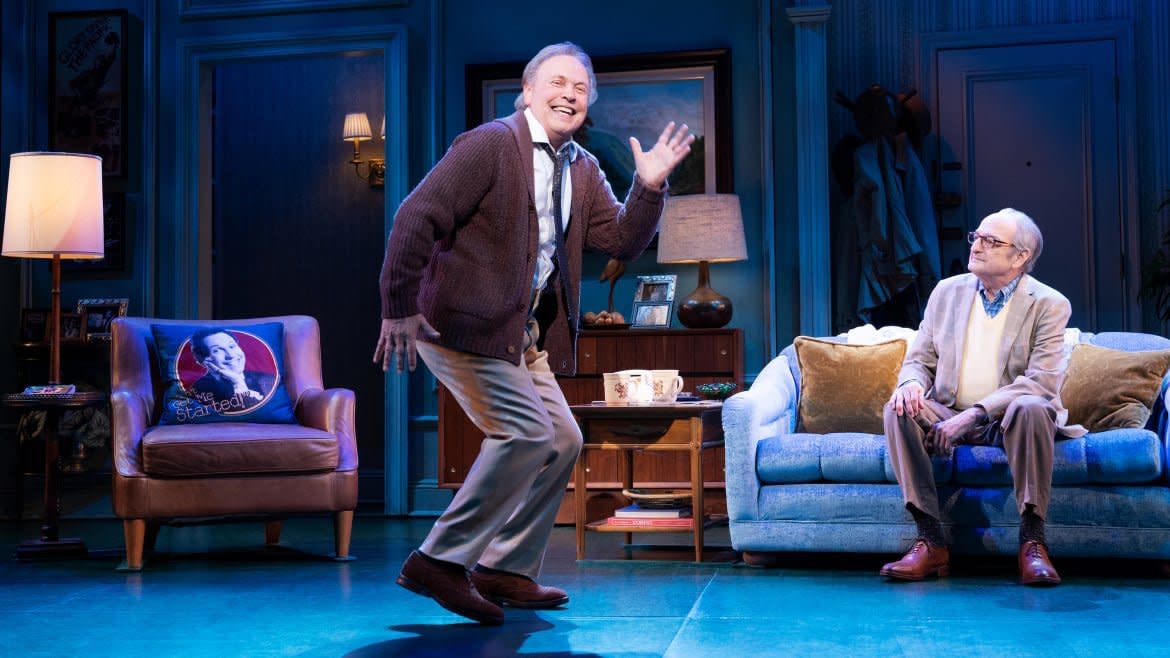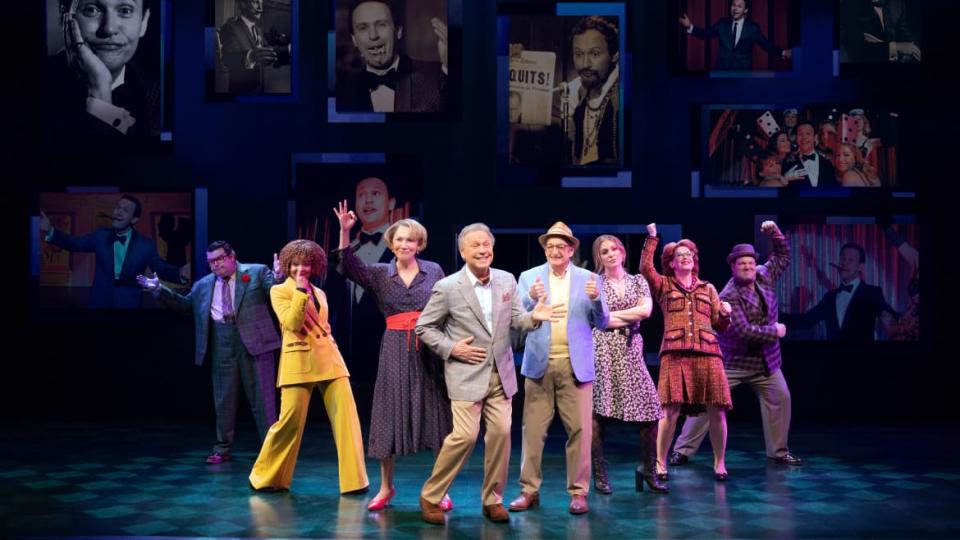Billy Crystal Gives ‘Mr. Saturday Night’ Charm, Laughs, and No Drama

- Oops!Something went wrong.Please try again later.
- Oops!Something went wrong.Please try again later.
- Oops!Something went wrong.Please try again later.
- Oops!Something went wrong.Please try again later.
As it turned out, Mr. Saturday Night was perfect to watch on a Sunday afternoon. It’s billed as a musical comedy, but really it feels like an amiable comedy with some songs scattered on it, like icing sugar on a light sponge. Its star Billy Crystal wrote the book with Lowell Ganz and Babaloo Mandel; the music is by Jason Robert Brown, and lyrics by Amanda Green.
The show is a ranging 2 hours and 40 minutes (opening Wednesday night at the Nederlander Theatre, booking to Sept. 4), but in the spirit of many good things on stage, it does not dawdle under John Rando’s easy-as-it-goes direction, instead ambling pleasantly and un-challengingly along at its own pace.
Comedy Is His Calling: The Brilliance of Billy Crystal
Crystal plays a comic, Buddy Young Jr., who was famous way back when. He has a devoted wife, Elaine (Randy Graff), long suffering but not putting up with any of his nonsense, a hangdog-expressioned brother, Stan (David Paymer), who was once his manager and with whom he has a scratchy if loving, very brotherly relationship, and a daughter, Susan (Shoshana Bean), to whom he is close but who also has problems with him.
The play takes place in the modern day of 1994 and in the past of the 1940s and ’50s, when Buddy rose from playing Borscht Belt Catskills resorts to primetime TV star. The question facing him in the modern day is the perennial one facing celebrities of yesteryear, at least in comedies or dramas about stars of yesteryear: Can Buddy make a comeback? This is made an especially urgent question after Buddy is mistakenly featured in an awards show’s “In Memoriam” segment.
The question of Buddy reclaiming his crown is at least partly down to Annie Wells (Chasten Harmon), a young agent who takes over wrangling his career, and if Mr. Saturday Night ever flirts with an unsurfaced nastiness within Buddy, it is in how he initially treats and speaks to Annie. Harmon is Black, and so the patronizing, dismissive, and plain rude tone Buddy initially takes with her seems especially sour and suspect. But Harmon’s Annie also isn’t about to accept such treatment and—at least from the audience this critic sat among—earned a voluble round of applause when she makes this clear.
If you love Billy Crystal, book a ticket. He’s funny, charming, not grandstanding. He has great shtick, a battery of chuckle-inducing one-liners, and we—as the audience—double as Buddy’s audiences in both 1950s primetime and in the retirement communities he is playing in the 1990s (Jeff Suggs’ projections provide a neat first visual joke here).
“It was a retirement center,” he later relates to Elaine of this first gig we watch. “They couldn’t laugh. They had to concentrate on breathing. Poor things were exhausted from building the pyramids.”
At one of the Borscht Belt resorts he played as a younger comedian, he has this one: “Two more Jews on a bench. Why are they always on a bench? One of them is blind. So one Jew hands the blind one a sheet of matzo. The blind guy puts his fingers over it and says, ‘Who wrote this crap?’”
Mr. Saturday Night allows Crystal to not only do what he does best—tell jokes—but also stretch some dramatic muscles, as Buddy ponders his comeback and faces professional worries and family issues.
His character, though, is a bit of a mystery. Stan calls him “a big, wrinkled child,” which seems about right—despite Crystal’s plumply smooth face. He’s no monster, but he still wants fame. He’s been, by some measure, a lacking brother and dad but knows about his errors, and here does a minimum level of atonement for them.

The company of “Mr. Saturday Night.”
It is Paymer and Bean who give those trickier scenes their glancing heft, as they confront Buddy with how he has hurt them—all will go unspoiled here. Graff’s is another traditionally thankless role—the underwritten, supportive wife—and so we also welcome every barb she is given to lob Buddy’s way, and her Act II song of desired escape, “Tahiti.”
The tension in Mr. Saturday Night is: Will Buddy mess up his chance of modern-day success, his return to the screen, to fame because of flaws in his personality? Again, the drama doesn’t drill terribly deep on what these flaws might be. He may have been a little hotheaded on set back when he was famous; he certainly may have used Susan as a prop on TV and not been an attentive father off it. But Mr. Saturday Night never really unearths Buddy’s deeper, darker self. Honestly, at least with Crystal playing him, it doesn’t seem to be there—and that’s fine. Macbeth and A Strange Loop are nearby if you want all that.
Buddy’s return to fame may or may not come (go on, guess which!) via the son of the owner of the Borscht Belt hotel he used to perform in, who is now making movies. He loved listening to Buddy when he was a kid, and has the same delight today.
Here, Mr. Saturday Night decides to give Crystal a dark night of not-quite-the-soul, when all his supposed transgressions and weaknesses and demons must be confronted. Well, Crystal looks anguished enough, even if Buddy’s bad aspects, personal flaws, and demons never seem to amount to much. This critic felt the one person who really deserved more of an apology than she finally got from Buddy was Annie.
But really, Mr. Saturday Night isn’t interested in pursuing too many gritty avenues of personal abasement and contrition of its subject; there is no granular torch shone into Buddy’s mind. You might expect there to be the traditional revelations of the unseen comic—the serious or tragic figure behind the easy charm and laughs on stage; the ugliness under the sunny smile and pan-stick. But no. Buddy is the same on stage as off—genial, a bit of an emotionally clumsy doofus, but no poisonous patriarch or vain and lacking ex-TV god. He seems to want to make everyone smile.
Yes, there’s a feelgood ending in Mr. Saturday Night, and it really does feel good. The charm is still very much with Buddy, and Billy Crystal too.
Get the Daily Beast's biggest scoops and scandals delivered right to your inbox. Sign up now.
Stay informed and gain unlimited access to the Daily Beast's unmatched reporting. Subscribe now.

